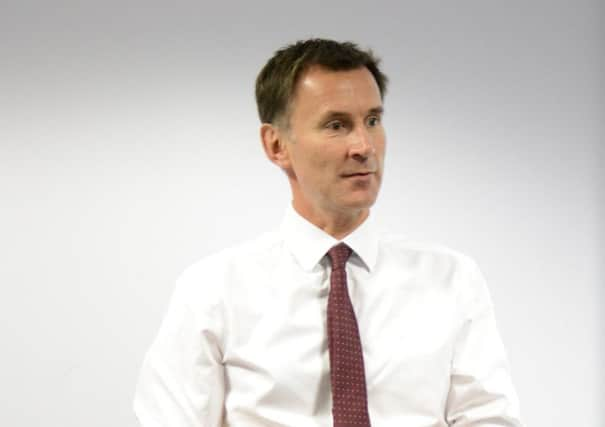NATIONAL: Medical staff who make '˜honest mistakes' in treating patients to get more support


Mr Hunt has accepted the main findings of a review into the use of gross negligence manslaughter in healthcare amid concerns the fear of criminal proceedings was having a ‘chilling effect’ on the medical profession.
The health secretary ordered the inquiry by the eminent surgeon Professor Sir Norman Williams in February following the outcry over the treatment of Dr Hadiza Bawa-Garba.
Advertisement
Hide AdAdvertisement
Hide AdThe trainee paediatrician was found guilty of gross negligence manslaughter in 2015 over the death at Leicester Royal Infirmary of six-year-old Jack Adcock after he developed sepsis in 2011.
A tribunal ruled she should remain on the medical register despite the conviction, but in January the General Medical Council (GMC) succeeded in getting her struck off after taking the case to the High Court.
The GMC’s actions angered many doctors who complained important issues raised by the case - including dangerous levels of understaffing, failures of IT systems, and staff being required to work in inappropriate conditions - had been ignored.
In his report, to be published in full today, Sir Norman calls for a ‘clearer understanding’ of when proceedings for gross negligence manslaughter should be brought in healthcare, so practitioners are reassured they would apply only in cases of ‘very poor performance’ and not ‘honest mistakes’.
Advertisement
Hide AdAdvertisement
Hide AdWhile accepting the findings, Mr Hunt has sought to reassure patients and their families that there will be improved scrutiny of deaths in the NHS, with the roll-out of a system of medical examiners - senior doctors who will look at all patient deaths which are not referred to a coroner.
Officials said the changes would mean bereaved families would get more information about the circumstances of their loved ones’ deaths while more data would be shared across the NHS to help prevent avoidable deaths.
Mr Hunt said: ‘When something goes tragically wrong in healthcare, the best apology to grieving families is to guarantee that no-one will experience that same heartache again.
‘I was deeply concerned about the unintended chilling effect on clinicians’ ability to learn from mistakes following recent court rulings, and the actions from this authoritative review will help us promise them that the NHS will support them to learn, rather than seek to blame.’